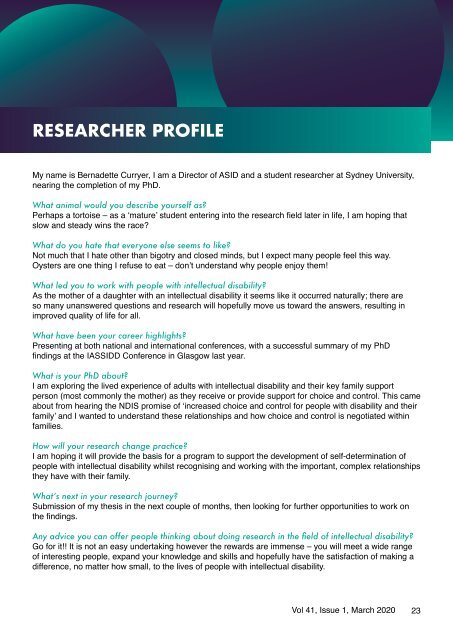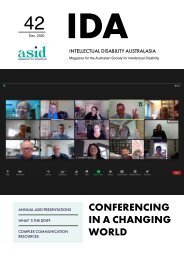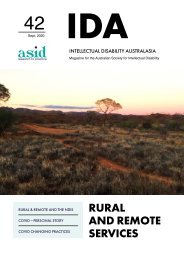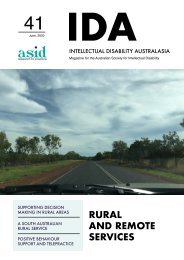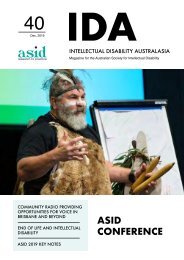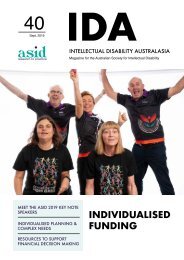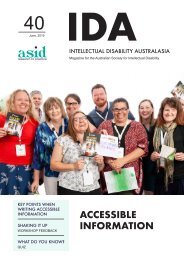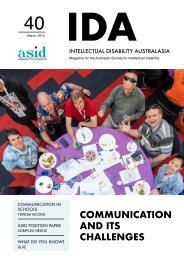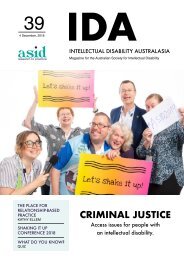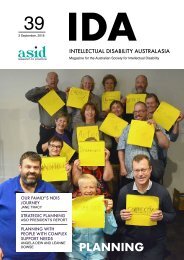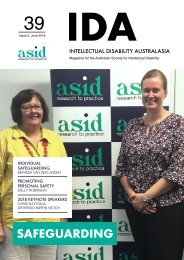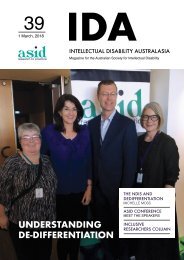IDA Volume 41 Issue 1 March 2020 (Mar 2020)
You also want an ePaper? Increase the reach of your titles
YUMPU automatically turns print PDFs into web optimized ePapers that Google loves.
RESEARCHER PROFILE<br />
My name is Bernadette Curryer, I am a Director of ASID and a student researcher at Sydney University,<br />
nearing the completion of my PhD.<br />
What animal would you describe yourself as?<br />
Perhaps a tortoise – as a ‘mature’ student entering into the research field later in life, I am hoping that<br />
slow and steady wins the race?<br />
What do you hate that everyone else seems to like?<br />
Not much that I hate other than bigotry and closed minds, but I expect many people feel this way.<br />
Oysters are one thing I refuse to eat – don’t understand why people enjoy them!<br />
What led you to work with people with intellectual disability?<br />
As the mother of a daughter with an intellectual disability it seems like it occurred naturally; there are<br />
so many unanswered questions and research will hopefully move us toward the answers, resulting in<br />
improved quality of life for all.<br />
What have been your career highlights?<br />
Presenting at both national and international conferences, with a successful summary of my PhD<br />
findings at the IASSIDD Conference in Glasgow last year.<br />
What is your PhD about?<br />
I am exploring the lived experience of adults with intellectual disability and their key family support<br />
person (most commonly the mother) as they receive or provide support for choice and control. This came<br />
about from hearing the NDIS promise of ‘increased choice and control for people with disability and their<br />
family’ and I wanted to understand these relationships and how choice and control is negotiated within<br />
families.<br />
How will your research change practice?<br />
I am hoping it will provide the basis for a program to support the development of self-determination of<br />
people with intellectual disability whilst recognising and working with the important, complex relationships<br />
they have with their family.<br />
What’s next in your research journey?<br />
Submission of my thesis in the next couple of months, then looking for further opportunities to work on<br />
the findings.<br />
Any advice you can offer people thinking about doing research in the field of intellectual disability?<br />
Go for it!! It is not an easy undertaking however the rewards are immense – you will meet a wide range<br />
of interesting people, expand your knowledge and skills and hopefully have the satisfaction of making a<br />
difference, no matter how small, to the lives of people with intellectual disability.<br />
Vol <strong>41</strong>, <strong>Issue</strong> 1, <strong><strong>Mar</strong>ch</strong> <strong>2020</strong><br />
23


